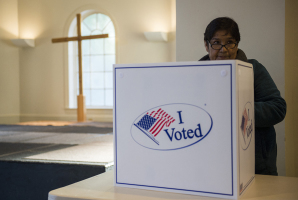The silence of the Church: The problem (part 1)
Editor's note: This is part 1 of a 2-part series on the Church and speaking about sexuality issues.

I hesitated to write this article because I am not a pastor or a theologian. But I am a Christian counselor, working with the wounded, and desperate for the spiritual back-up of the Church. I often feel like a paramedic, out in the field, treating people on the scene, ready to send the wounded to the hospital, but finding hospitals no longer assist with these types of cases.
The wounded I treat are the victims of the sexual revolution that eventually led to the LGBT movement. They are bombarded with the lies of the culture — “born gay, can’t change; it’s harmful to try to change; gay is good; dissent is bad; gender is inconsequential.” As a former president of a research organization that reviewed the science behind the issue of homosexuality, I know those claims are false. And as a Christian, I know that God has a plan for people who have unwanted same-sex attractions — attractions that are neither genetic nor a choice. I know God also has more for people who are dissatisfied with their biological sex or who feel uncomfortable in their bodies. But part of the tragedy is that people who are deceived by the cultural lies are not hearing these truths.
The silence of the Church
LGBT issues are the issues of the day. I meet with teenagers and young adults who are immersed in cultural deception. They say they have same-sex attractions, or they want to be the opposite sex. Their parents are telling them God’s Word says not to act on those feelings, that there are other options for them. However, their siblings, peer group, and culture are telling them God’s Word is outdated or misinterpreted and they would be denying their true selves if they did not act on their feelings. They are not sure whether to believe their parents or the culture. I ask them what their pastors say about it. They tell me their pastors and youth pastors say nothing about it.
As a therapist, one of my jobs is to help clients accomplish their goals. Yet some of the clients facing same-sex attraction or gender confusion are unclear about their goals. They seem to be more confused now than ever before. As the culture speaks louder on these issues, the churches and Christian schools seem to be going silent. As I try to help my clients navigate the confusion and internal conflict, I often feel desperate to have the backup of their churches and Christian schools. While some churches and schools are effectively addressing these topics, many are not. I am not exactly sure why the Church at large has grown silent on these issues, but I have some theories:
Lacking expertise — Some pastors are still willing to lovingly preach from God’s Word, including the sections related to biblical sexuality and prohibitions against all other forms of sexual activity. However, some who still teach Scripture may feel ill-equipped to tackle the specifics of homosexuality and gender dysphoria. In those cases, pastors can invite guest speakers to come and help address these issues and share personal testimonies.
Not wanting to detract from the Gospel — Some pastors and even school principals are concerned that they might turn people away from God if they tackle such controversial issues as LGBT issues. They want to keep the message of salvation open to all without getting caught up in trivial, divisive issues that might push people away from hearing the Gospel. This is a great concept, but issues related to identity and sexuality are by no means trivial. For some, these may become issues of life or death and Heaven or Hell. Some who listen to the messages of the culture and embrace a gay or transgender identity will end up walking away from God completely. Without an understanding of God’s perspective on these issues, without a concept of why they have these feelings and what they can do about it, many will follow the powerful trend of our day and go the way of their flesh. The Bible is clear that a person cannot follow the flesh and yield to the Holy Spirit at the same time (Romans 8:5-13).
Jesus emphasized complete surrender, even at the risk of turning people away. When the rich young ruler asked Jesus how he could be saved, Jesus told him to go and sell all that he had and give to the poor. This man went away sad, knowing he could not fully surrender every aspect of his life. Jesus did not hold back, knowing the man would turn away and not receive the gift of eternal life. Jesus made it clear that total surrender is foundational to receiving salvation, and He addressed this man’s specific area of struggle (Mark 10:17-27; Matthew 19:16-22).
Avoiding offense — In some cases, silence may stem from the influence of recent authors who encourage pastors and Christian leaders to be more “welcoming” and less offensive to the LGBT community. Christians should certainly be known for love, and sadly, Christians have not always been loving or welcoming to the LGBT community. However, in their attempt to be welcoming, these particular authors seem to advocate an unbiblical form of love. They advocate love at the expense of truth. Yet, love without truth is not really love at all. Both love and truth are needed. Either one without the other is incomplete. An unhealthy preoccupation with avoiding offense can lead to silencing the truth.
Fear of man— Finally, some Christian leaders may be fearful of the repercussions that come from taking an unpopular stance. They may fear losing church members or tuition dollars. Or perhaps they fear personal loss, such as the loss of reputation or good standing in the community. While fear may be understandable, fear of God must always override the fear of man.
In summary
Thankfully, not all churches are silent on these topics. Some pastors and Christian leaders are boldly and lovingly addressing these issues and shepherding their flocks well. Seven years ago, I was working with a client who had a strong Christian background but who was caught up in the lies of the culture. This teenager wanted help to walk away from homosexuality, but also had periodic doubts. One Sunday morning his pastor preached a sermon on homosexuality that was empowering to my client. He came to the session the following week with the encouragement he needed to keep moving forward. As his counselor, I experienced the backup of the Church that day. Those of us who are in the trenches helping the confused and broken need backup. I pray more Christian leaders will address these issues from God’s perspective, providing help for the wounded, who are crippled by the lies of the culture and urgently need to hear God’s truth — always presented in love.
Dr. Julie Harren Hamilton is a licensed marriage and family therapist in private practice. She is a former Assistant Professor of Psychology in the Graduate Counseling Psychology program at Palm Beach Atlantic University (2004-2009). Dr. Hamilton served as President of the National Association for Research and Therapy of Homosexuality (NARTH) 2009-2011. She speaks in a variety of contexts including media outlets, churches, colleges, and schools and also conducts seminars for pastors and Christian leaders.




























